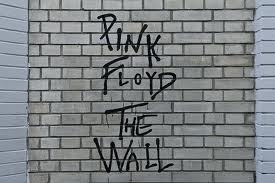 Originally published by L.S. Media. February 27th 2012.
Originally published by L.S. Media. February 27th 2012.
L.S. Media Rating *****
In the world of musical clichés, one of the most often bandied about and repeated with startling regularity is that Pink Floyd’s 1979 album, The Wall, is the greatest moment of Rock music captured for posterity forever.
No matter what neither your own personal view, nor this particular reviewer’s for that fact, it stands to reason it captures the moment, the times it was released in, the introspection of the self perfectly. The world of music was teetering on a well sharpened knife’s edge. The rise and fall of Disco had hardly worried the established artists of the time, to some it was even worth an experiment with, a passing phase that got people up to dance and enjoy their life against the back-drop of world recession and the beige that had come to dominate their lives. Punk too had come along and shook a wonderful glorious fist at the hierarchy whilst writing music that would have been seen, depending on your point of view, a semblance of misspent youth, a generation that was falling apart at the seams or more likely reminding the world that their views were not being heard, the music they created was their way of hammering home the point that change must happen.
Not for the likes of The Stranglers, The Clash and every other decent Punk band around at the end of the decade would they advocate going onto the streets and setting fire to the world. They wanted to be part of society but have a voice that the establishment had to hear. They used music and lyrics such as The Stranglers, No More Heroes or the brutally honest Something Better Change to drive home the point. No need to set fire to an old department store in Croydon. They were angry; rightly so, at the opportunity that was passing each one of Britain’s youth go past with no thought of what was to come. This was Generation X worrying rightly about Generation Why?
Pink Floyd, along with other Progressive Rock bands such as Genesis, King Crimson and Yes fell foul of some of these bands, (strangely not the Stranglers) for their tired, dusty conforming ways. They were old hat, they were musical dinosaurs that belonged to a different generation and they had to become as extinct as the lumbering beasts of the past.
The Wall came about at a gig performed by the band in America where at one point Roger Waters, bass player and main song writer for the band since the late and much loved Syd Barrett finally left the band many years earlier, spat on a fan during one of the songs in the concert. The experience repelled Roger and out of this disgust for himself, the vision of The Wall took gradual shape.
Looking back at this album with over 30 years between being laid down on vinyl and the release of the new Immersion release can be daunting. There has been so many releases, so many collectors editions, live editions, one offs, it all becomes a bit of a blur. It does need to be said that if you don’t own The Wall, it is well worth purchasing the new Immersion release, not just for the music but also for the extras you will have no doubt missed along the way. If you do happen to already have a copy, re-acquaint yourself with one of the best moments of music ever.
The Wall doesn’t deal with the times, the nation or its people lived in, it has its critics for that and in a way it’s an unfair accusation, as the notion of seeing the country and what had happened to its past and what could possibly happen if it’s inhabitants allowed the spectre of Fascism to rise and threaten once again is the sub plot to Pink’s mental state of mind. Seen through the eyes of a Rock star named Pink, the album shows why he is on the verge of burn out and ultimately a nervous breakdown, his repulsion at the relationship he had with his mother, the unhappy marriage, the cocktail of drink and drugs and the inability to change his past and his future are all dealt with, pondered over and in the end, like Pink, spat out and left for dead.
It may not look at what was happening to the world in say the same way as The Clash with London Calling or The Sex Pistols God Save The Queen did two years earlier but its introspection, its desire to show that man is fallible, is to this day a very necessary piece of work to listen to and savour. Lyrics aside; which in any Pink Floyd album is a very difficult job to divorce yourself from the meaning of Roger’s, or earlier Syd’s, words written on the inlay sleeve, the music comes across as some of the most haunting, most direct and dynamic of the last 40 years. There is no mistaking David Gilmour’s incredible guitar solo on Comfortably Numb, there can be no reason not to feel the pain in your soul as your heart is ripped apart by Michael Kamen’s Orchestra and as for the trial scene, it just leaves your mind scuttling for a small hidey hole, terrified at the enormity of it all.
The lyrics complement the music like very few albums have actually ever done. The complex trail of thought that Roger put into such songs as Mother and Hey You are there for analysts to work for many years on their real meaning and in all likely hood nobody will ever really understand it. Nobody Home dwells on the slide into extreme and bitter loneliness, is there any better opening to a song that Roger woefully lamenting, “I’ve got a little black book with my poems in, I’ve got a bag and a toothbrush and a comb in, When I’m a good dog they sometimes throw me in a bone in…and that’s is how I know, when I try to get through, there’ll be nobody home.” If by the end of that song you are not feeling the depths of Pink’s nearly destroyed soul then in all probability you will go throughout life, sailing through with never a problem in your existence again
However if you are human, if you have shred of humanity about you, you will despair for Pink and be sucked into the nightmare vision to come.
It is up to the latest generation of music fans what they will make of the new Immersion release, it is hoped they get the message.
Pink Floyd: The Wall, Immersion Box Set is on sale now.
Ian D. Hall
